This post is also available in: Español (Spanish) English
Durant dues setmanes de maig de 2023, part de l’equip de femProcomuns hem estat al Quebec (Canadà) per fer algunes xerrades i tallers sobre el Model de Sostenibilitat del Procomú, conèixer experiències, projectes comunitaris i de l’economia solidària i també per participar a la trobada La Grande Transition. Aquest viatge ha estat possible per la col·laboració que tenim des de fa un temps amb Projet Collective, Cultiver les communs i el col·lectiu de recerca Critic. El Quebec té una economia solidària forta i un interès creixent per reconèixer, impulsar i articular els procomuns.

Montréal
Montréal és la primera ciutat en població del Quebec i la segona del Canadà, situada en una illa en la confluència de dos rius. El cooperativisme, l’economia solidària i els projectes comunitaris hi són molt presents. Des de 2017 la candidatura Project Montréal governa la ciutat, amb similituds amb el govern municipal de Barcelona de les darreres dues legislatures, tant en les transformacions que s’han pogut fer com en les que no han estat possibles, en els principis i en les contradiccions. Arribem i fa una calor que no ens esperàvem, de més de 25 graus. Passats uns dies refresca i s’arriba a zero, després torna a fer calor. Al barri on som les cases són edificis de dos pisos amb escales per fora que donen accés a cada apartament, un jardí obert a davant i darrera donen a la «ruelle», un carreró per on passen els cables d’electricitat i d’internet, on s’estén la roba amb un cordill amb politja que les travessa. Les «ruelles» s’han reivindicat com espais veïnals i comunitaris, hi ha murals a les parets i s’hi han plantat plantes i flors. També s’hi ha pacificat el trànsit i la canalla hi juga.
El coworking de Temps Libre a Mile-End
Al barri de Mile-End una rampa metàl·lica amb un mural pintat a la barana dona entrada a l’espai de cotreball «Temps Libre», gesitonat per una cooperativa de solidaritat fundada al 2015. Dins l’espai, un text en francès i anglès anuncia «Temps Libre és un lloc neutral i no comercial que afavoreix els intercanvis i les trobades». Aquest ha estat un dels espais de referència en la nostra visita a Montréal. Allà hi hem fet tres trobades, una amb l’equip de Projet Collectif, una amb el col·lectiu de recerca CRITIC i un amb participants del projecte Solon.
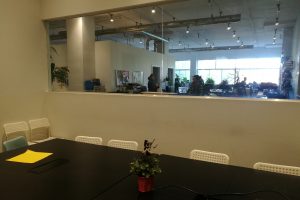
Projet Collectif és una OBNL (fòrmula legal de les entitats sense afany de lucre al Quebec) amb 350 membres (meitat organitzacions i meitat individus) representants de diversos sectors i de regions del Quebec, que sostenen el projecte. La trobada tenia com a objectiu conèixer l’equip i explicar-los què és femProcomuns, com funcionem i quins projectes desenvolupem des de la cooperativa.
Project Collectif està desenvolupant encommun.io, un espai digital per enfortir la col·laboració entre sectors i connectar coneixement i persones. La plataforma uneix dues eines: Passarelles i Praxis. Passerelles facilita la trobada entre persones segons temàtiques i àrees d’interès; el seu desenvolupament va iniciar-se en el si de TIESS (Territoris innovadors en economia social i solidària) per crear vincles i transferència de coneixement i ha continuat amb Projet Collectif. Praxis facilita la documentació de coneixement, iniciatives i recursos en fitxes que poden ser etiquetades i connectades entre sí. Darrera de Praxis hi ha propòsits i conceptes molts propers als que treballem amb Teixidora.net.
Però aquest no és l’únic projecte que estan impulsant, també treballen en la Xarxa d’agents de desenvolupament cultural digital (ADN, Réseau des agent.es de développement culturel numérique) que tenen una funció i activitats similars als espais d’alfabetització digital que a Catalunya fan els Punt TIC i la Xarxa Omnia. Amb l’equip de facilitació d’ADN vam fer una sessió sobre l’ús pràctic del Model de Sostenibilitat del Procomú, perquè puguin valorar si és una eina metodològica que poden utilitzar.
Amb l’equip de CRITIC (Col·lectiu de Recerca sobre Iniciatives, Transformacions i Institucions dels Comuns, Collectif de Recherche sur les Initiatives, Transformations et Institutions des Communs) també vam treballar sobre com el Model de Sostenibilitat del Procomú podria ser utilitzat per l’anàlisi i acompanyament de projectes al Québec. En la sessió, mig presencial mig online, hi havia acadèmics i estudiants de doctorat de diverses universitats, com la Universitat Laval de la Ville de Québec, HEC Montréal, Concordia (de Montreal) o Saint-Paul University (de Montréal).
En el mateix espai de Temps Libre ens hi vam trobar amb dues de les 30 persones que treballen a la organització sense afany de lucre Solon. Es van posar en marxa el 2015, com a conseqüència de la seva implicació en la transformació i dinamització de les «ruelles» on donen els patis de darrere de les casetes dels barris de Montréal. Al 2019 van rebre una subvenció important, dins del Repte Ciutat Intel·ligent, amb l’objectiu de treballar durant 5 anys la mobilitat. A partir de treballar la mobilitat i de promoure la reducció de la dependència dels cotxes van anar sortint altres àrees de treball, les ciutats de 15 minuts (on pots trobar resposta a les teves necessitats en un radi de 15 minuts caminant), la promoció de l’intercanvi de cotxes i bicicletes, la promoció del comerç local, l’accés a una alimentació sana en barris convertits en “deserts alimentaris”, etc.
Treballen principalment en el projecte LocoMotion, en les activitats de mobilització i sensibilització dels ciutadans entorn a la mobilitat; i en els anomenats Atéliers de Transition i els Espaces des Possibles. Aquests últims són espais d’ús públic, dinamitzats i autogestionats, per respondre les necessitats del veïnat. Hi ha dos espais, un en el barri de la Petite Patrie i l’altre al barri d’Ahuntsic, ambdós estan concebuts com a Tiers lieux, “tercers llocs” que faciliten la interacció social informal, en el sentit en que va definir-los el sociòleg Ray Oldenburg, i promouen la participació en l’autogestió per part del veïnat que els utilitza.
Uns dies després de la trobada vam anar a l’Espace des Possibles d’Ahuntsic, situat en un dels dos carrers d’una de les «autopistes de bicicletes» que travessa tota la ciutat i que és una de les polítiques públiques més significatives del govern de Projet Montréal. Té molt sentit, doncs, que hi hagi un espai de reparació de bicicletes. Els projectes a l’Espace des Possibles surten de les necessitats del barri, són facilitats per Solon i busquen anar implicant a la gent amb la perspectiva que pugin arribar a ser autogestionats. El taller té activitats obertes i gratuïtes on es formen les persones, tant en l’ús com en el manteniment i reparació de les bicicletes. Qui facilita el taller és també la responsable d’un projecte de mecànica feminista. El dia que hi vam anar hi havia una barbacoa oberta al barri, situació que afavoria el debat sobre l’alimentació. En rotllana es passava una pilota amb el globus terraqui i la gent que l’entomava explicava com havia canviat la seva alimentació a partir de la pandèmia. Al barri han tancat moltes botigues i un dels únics supermercats que hi havia, per comprar segons què han d’agafar el cotxe. La ronda es completava amb l’explicació projectes comunitaris i de l’economia solidària de l’àmbit de l’alimentació. L’espai està en una casa com qualsevol altra del barri que tenen llogada, hi ha una gran sala i també una cuina. Han llogat també la casa del costat amb la idea de que entre les dues s’hi combinin activiats obertes gratuïtes amb activitats que generin ingressos per sostenir el projecte en conjunt.
L’Upop a Les Oubliettes
Dos dijous al vespre, hem estat al Café Les Oubliettes on durant 5 setmanes, s’hi fa el curs «Cuidar-se, compartir i decidir juntes. Petita guia del procomú»<(«Prendre soin, partager et décider ensemble. Petit guide des communs») de l’Upop (la Universitat Popular de Montréal).
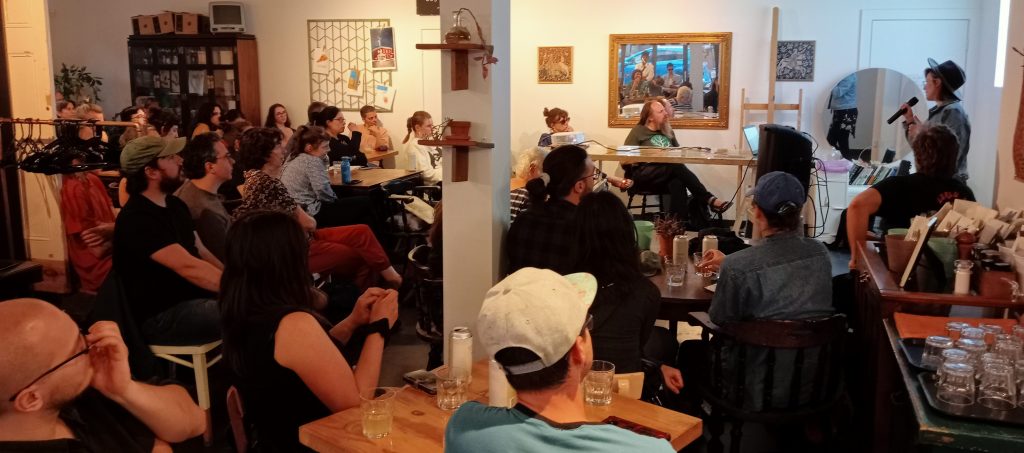 Ens havíem perdut la primera sessió d’introducció que va fer el Jonathan Durand Folco el 4 de maig. Vam poder ser en la segona sessió que va fer la Marie-Soleil L’Allier l’11 de maig sobre «Les pràctiques del procomú al Québec: tipologia, reptes i palanques» on es van presentar els resultats d’un estudi empíric sobre les pràctiques del procomú («commoning») que emergeixen en el territori del Quebec des de la crisi financera de 2007-2008. Es tracta de 70 conjunts urbans i rurals, que cobreixen prop de 20 àmbits d’activitat, estudiats amb l’objectiu de produir una tipologia de les pràctiques del procomú.
Ens havíem perdut la primera sessió d’introducció que va fer el Jonathan Durand Folco el 4 de maig. Vam poder ser en la segona sessió que va fer la Marie-Soleil L’Allier l’11 de maig sobre «Les pràctiques del procomú al Québec: tipologia, reptes i palanques» on es van presentar els resultats d’un estudi empíric sobre les pràctiques del procomú («commoning») que emergeixen en el territori del Quebec des de la crisi financera de 2007-2008. Es tracta de 70 conjunts urbans i rurals, que cobreixen prop de 20 àmbits d’activitat, estudiats amb l’objectiu de produir una tipologia de les pràctiques del procomú.
Vam participar en la tercera sessió, el 18 de maig, impartida per la Marie-Anne Perreault, amb el títol «Desenllaçar les tensions internes: la governança dels comuns en la pràctica» («Dénouer les tensions internes : la gouvernance des communs en pratique»). Es va parlar de com la creació, la col·laboració o l’activitat comuna impliquen l’ús dels principis d’autogestió, la presumpció d’igualtat d’intel·ligència i intel·ligència col·lectiva. Es van explorar eines per a facilitar la presa de decisions, la distribució d’idees, la resolució de conflictes i la creació d’un marc de seguretat d’intercanvis per a facilitar una gestió viable i col·lectiva del procomú. També hi vam presentar el Model de Sostenibilitat del Procomú, com una eina d’anàlisi i construcció de projectes del procomú, vam parlar del joc de l’economia del procomú dels textos que ja hem traduït al francès.
Transition en commun
El 24 de maig plovia intensament a Montreal. Vèiem ploure per un costat sobre la muntanya del Mont Real i des de l’altre costat sobre el barri de Milton-Parc des de les finestres de Cité-des-Hospitalièrs. Un antic edifici religiós avui «en transition» per incubar projectes per part de l’ajuntament de Montreal. Conjuntament amb la Marie-Soleil L’Allier, la Mònica Garriga va facilitar part d’una sessió del grup Transition en commun. Es tractava d’analitzar el seu projecte des dels pilars del Model de sostenibilitat del Procomú. Transition en commun és una aliança entre una cinquantena d’entitats, entre ciutadans, actors i organitzacions de la societat civil, la ciutat de Montréal i altres institucions, per mobilitzar la ciutat entorn d’una visió compartida de transició socioecològica. Han rebut una subvenció de la Fundation Lucie et André Chagnon per implementar aquesta transició en els barris. La seva prioritat és treballar amb la reducció de l’ús de cotxes a la ciutat, habitatge i democràcia participativa.
Ottawa i Gatineau
Ottawa, amb prop d’un milió d’habitants, és la capital del Canadà i està situada a la província d’Ontario, al costat del riu Ottawa que delimita la frontera entre aquesta província i la de Quebec. Ottawa té aspecte de ciutat administrativa, on treballa bona part del funcionariat de l’estat. Els edificis de pedra del parlament contrasten amb els grans edificis d’oficines. Creuant el riu i dins la mateixa conurbació urbana però en una altra província Gatineau, amb quasi tres-cents mil habitants, és la tercera ciutat en població de Quebec.
Escola d’Innovació social Élisabeth-Bruyère
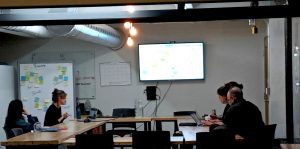 Amb en Jonathan Durand Folco vam visitar l’École d’innovation sociale Élisabeth-Bruyère que, amb altres professors, ha impulsat al a Université St Paul, a Ottawa. Allà hi vam fer una presentació sobre el Model de sostenibilitat del procomú i les eines que hem desenvolupat per enfortir projectes i sectors clau.
Amb en Jonathan Durand Folco vam visitar l’École d’innovation sociale Élisabeth-Bruyère que, amb altres professors, ha impulsat al a Université St Paul, a Ottawa. Allà hi vam fer una presentació sobre el Model de sostenibilitat del procomú i les eines que hem desenvolupat per enfortir projectes i sectors clau.
Des de 2017 existeix un Departament d’Innovació Social, creat amb el propòsit de canviar la manera com es treballa en la promoció de l’emprenedoria, no centrant-ho en la creació d’empresa privada amb orientació social, sinó per ser innovació des de l’Economia social, per la transformació ecològica i el procomú. Ara hi ha un curs preuniversitari,un grau en desenvolupament d’organitzacions socials i un postgrau.
L’escola d’innovació social compta amb el CRITS (Centre de recherche sur les innovations et les transformations sociales) per fer recerca sobre l’emancipació, l’acció social, la gestió democràtica, l’emprenedoria en organitzacions horitzontals, o la pedagogia en la recerca. El CRITS es troba dins l’Atelier d’innovation sociale Mauril-Bélange.
Cooperativa de desenvolupament regional de l’Outaouais
A Gatineau hem conegut la Cooperative de développment régional (CDR) de la regió Outaouais -Laurentides de Quebec. Ens han explicat que Quebec tenia 15 CDR,amb una funció molt similar als ateneus cooperatius catalans (femProcomuns formem part de l’Ateneu del Barcelonès Nord). Però un canvi de govern els va centralitzar i ara tots formen part d’un sol organisme, menys aquest, que no va voler integrar-se i ha demostrat que pot seguir fent molt bona feina amb autonomia. És una cooperativa integral (al Quebec se’n diuen “solidàries”) amb 14 persones treballadores i totes les entitats acompanyades com a usuàries.
La CDR assessora, forma i acompanya les iniciatives d’economia social i solidària. A més té altres dispositius vinculats. El Pol d’Economia Social Outaouais (un dels 22 pols de Quebec) fa la promoció de l’ESS i facilita la col·laboració amb altres agents del territori, a més de col·laborar amb el Chantier de l’économie sociale del Quebec, que ve a ser l’equivalent a la Xarxa de l’Economia Solidària a Catalunya. Un altre dispositiu és la Incubadora d’economia social de l’Outaouais, un programa d’incubació per a projectes col·lectius que dura entre 12 i 16 mesos. En el programa s’arriba a la constitució de la cooperativa, després de superar les fases de formació, prototipatge i primeres vendes. La incubadora marca un ritme calendaritzat, mentre que l’activitat normal de la CDR respon al ritme de les cooperatives a les que acompanya, i les dues aproximacions es complementen.
Le Rez-de-jardin
A la planta baixa d’un antic magatzem de mobles hi ha el projecte «Le Rez-de-jardin». L’edifici és propietat privada, però ha estat cedit durant 5 anys per a projectes comunitaris i de l’economia solidària. Hi conviuen tres iniciatives. Rack à Bécik és una cooperativa de solidaritat amb un taller d’auto-reparació, formacions i venda de bicicletes reutilitzades. No hi ha persones treballadores, les mateixes persones usuàries s’encarreguen del seu funcionament, de reparar les bicis i de formar altres persones per a què sàpiguen fer-ho. Bibli’Outils és una altra cooperativa de solidaritat en forma de biblioteca dels objectes, on s’hi poden fer projectes de creació, reparació o revalorització utilitzant els espais i les eines que s’hi ofereixen. Horti-cité és una OBNL (fòrmula legal de les organitzacions sense afany de lucre al Quebec) d’agricultura urbana amb iniciatives d’enverdiment o de creació de boscos urbans, d’«aménagement comestible o foodscaping»; en català en diríem «paisatgisme o jardineria comestible». Es tracta d’habilitar zones verdes que produeixen aliments.
Saint Camille
Saint-Camille és un municipi de poc més de cinc-cents habitants a l’est del Quebec. Té una història de cohesió comunitària i de lluites compartides, la més recent contra la mineria. L’extraccionisme al Canadà és molt explícit i agressiu (també hem visitat Asbestos, actualment Val-des-Sources, on hi havia fins el 2011 una de les mines d’amiant més grans del món). A Saint-Camille s’hi van fer sondejos per una mina d’or i la comunitat es va mobilitzar per impedir-ho.
Al centre cultural Le P’tit Bonheur hi vam fer una xerrada i sessió de treball amb el Model de sostenibilitat del procomú. La Marie-Soleil l’Allier i la Mònica Garriga van introduir-hi els conceptes del procomú i després s’hi va treballar amb el llenç del model de sostenibilitat. Hi van participar unes 20 persones. Els vam preguntar quin projecte volien treballar. Hi ha diversos projectes col·lectius, com l’ús comunitari de l’antiga esglèsia o el propòsit de fer una «cava» compartida per preservar els aliments a l’hivern. Però finalment el projecte que s’hi va treballar va ser la granja Le Clé des Champs. Aquesta havia estat una cooperativa que finalment no va tirar endavant i una parella en va assumir la continuïtat. Venen tot el que produeixen però treballen moltes hores i està als límits de la sostenibilitat. Col·laboren també amb l’escola fent visites educatives. La gent és conscient que la granja és una responsabilitat col·lectiva ja que els aporta aliments sans. És per això que cada pilar que vam treballar suscitava el debat: qui és la comunitat i amb qui es relaciona, quins recursos es mobilitzen (terra, aigua, energia, maquinària, diners), qui fa la feina (la família que se’n fa càrrec, una voluntària, treballadors temporals), com és i com podria ser la governança (tornar a una cooperativa?..) i com es comparteix el coneixement i les habilitats (activitats amb l’escola, web, butlletí,).
La Grande Transition, de nou a Montréal
La seu de la Universitat Concordia, al barri del mateix nom, va acollir durant tres dies i per tercera vegada «La Grande transition». A la primera planta hi ha l’auditori on s’hi van fer les sessions plenàries, al primer pis hi havia les parades de diferents revistes d’esquerra, llibertàries i dels moviments socials, principalment de Quebec, la resta de Canadà i els Estats Units. I al tercer pis hi ha les aules on s’hi van fer diverses sessions paral·leles. Van ser xerrades i taules rodones amb diferents temàtiques relacionades amb la transició social, econòmica i ecològica.
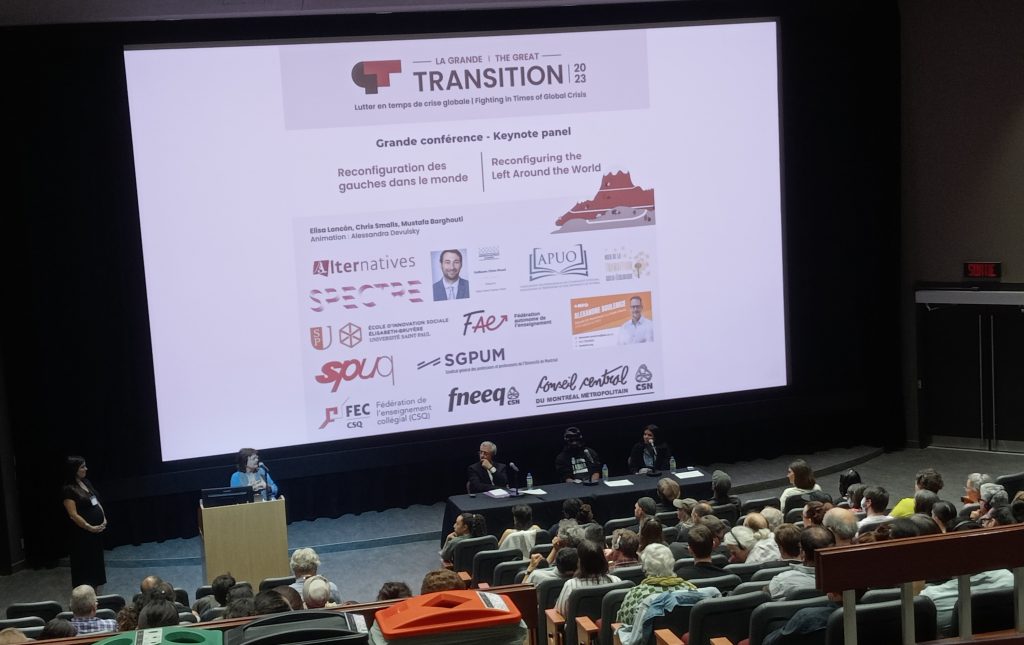
Model de sostenibilitat del procomú
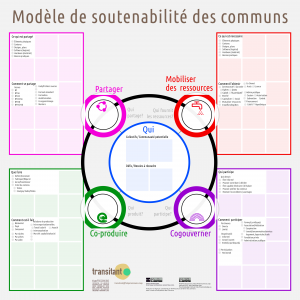 El Model de sostenibilitat del procomú és una eina per treballar projectes amb dimensió comunitària, que encaixin en el model socioeconòmic procomú o en models híbrids entra aquest i altres models econòmics. S’ha desenvolupat per part de femProcomuns a partir d’una primera versió de Free Knowledge Institute i amb diverses aportacions, entre les quals cal destacar les de l’equip de la cooperativa LabCoop. El model s’organitza en 5 pilars i 2 eixos. El primer pilar és la comunitat que ´te una necessitat o vol resoldre un repte. Un eix és el dels recursos a mobilitzar per part d’aquesta comunitat i la força de treball necessària. Un altre eix són els coneixements i habilitats a compartir dins i fora de la comunitat, perquè el projecte es pugui reproduïr, i la manera en que es governa el projecte. Per aplicar el model de manera pràctica, tant a projectes existents que volen analitzar-se o repensar-se, com a projectes nous, s’han creat materials gràfics i també continguts escrits i un joc. Tots aquests materials estan disponibles amb una llicència lliure copyleft (CC-by-sa) i accessibles per ser consultats i/o descarregats. Amb la col·laboració de Cultiver les commons i el Grup de treball ecosistema del procomú, s’han traduït aquests materials al francés i estan disponibles per ser descarregats a la web encommun.io.
El Model de sostenibilitat del procomú és una eina per treballar projectes amb dimensió comunitària, que encaixin en el model socioeconòmic procomú o en models híbrids entra aquest i altres models econòmics. S’ha desenvolupat per part de femProcomuns a partir d’una primera versió de Free Knowledge Institute i amb diverses aportacions, entre les quals cal destacar les de l’equip de la cooperativa LabCoop. El model s’organitza en 5 pilars i 2 eixos. El primer pilar és la comunitat que ´te una necessitat o vol resoldre un repte. Un eix és el dels recursos a mobilitzar per part d’aquesta comunitat i la força de treball necessària. Un altre eix són els coneixements i habilitats a compartir dins i fora de la comunitat, perquè el projecte es pugui reproduïr, i la manera en que es governa el projecte. Per aplicar el model de manera pràctica, tant a projectes existents que volen analitzar-se o repensar-se, com a projectes nous, s’han creat materials gràfics i també continguts escrits i un joc. Tots aquests materials estan disponibles amb una llicència lliure copyleft (CC-by-sa) i accessibles per ser consultats i/o descarregats. Amb la col·laboració de Cultiver les commons i el Grup de treball ecosistema del procomú, s’han traduït aquests materials al francés i estan disponibles per ser descarregats a la web encommun.io.
Agraïments
Volem agraïr a Projet Collectif, i molt especialment a la Marie-Soleil L’Allier i a Jonathan Durand-Folco, l’haver-nos convidat, l’haver facilitat la realització de xerrades i tallers, així com les visites a projectes i organitzacions. També volem agraïr a en Samuel Raymond i la Viviane Caron (i l’Spiky) haver-nos acollit a casa seva a Montreal. I agraïm molt a totes les persones que ens han explicat els seus projectes, que ens han dedicat el seu temps i que han atès les nostres preguntes i la curiositat per entendre les diferents dimensions de la sostenibilitat del que estan fent.
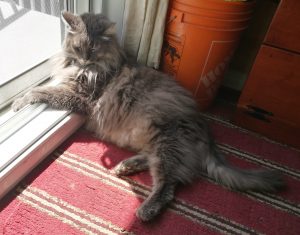

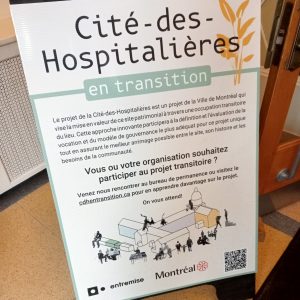
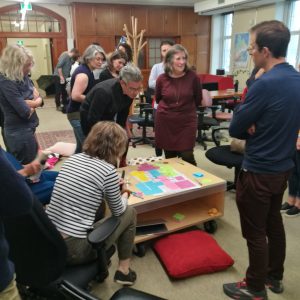
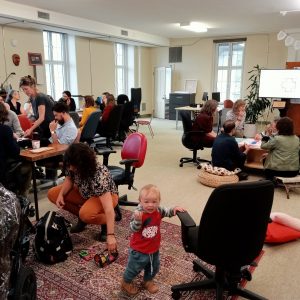
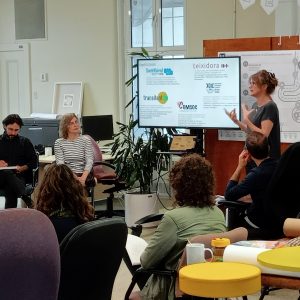
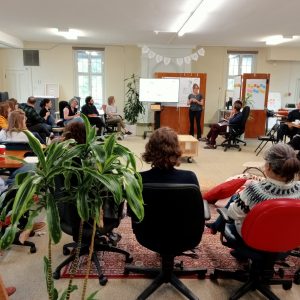
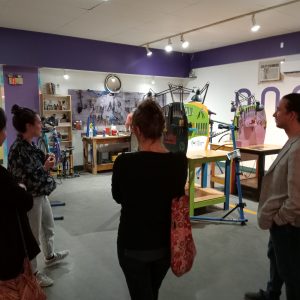
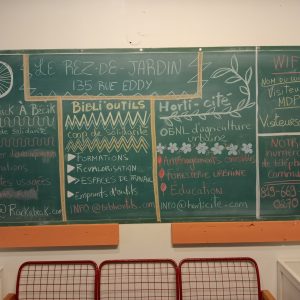
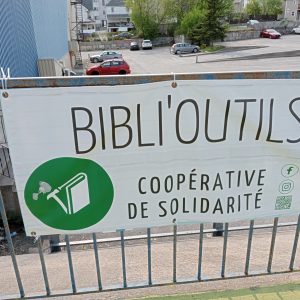
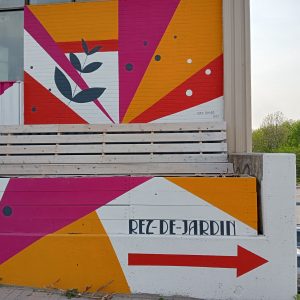
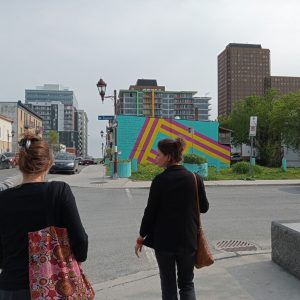
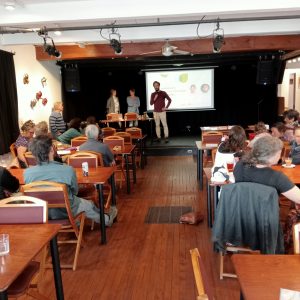
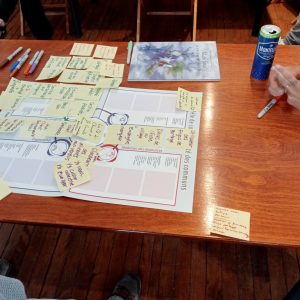
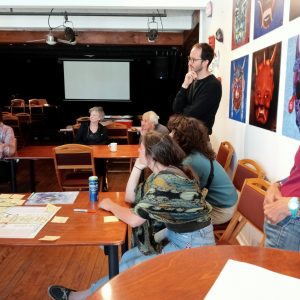
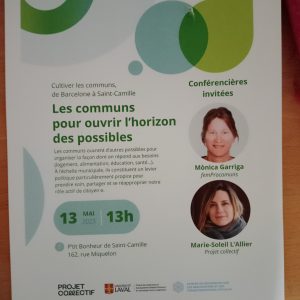
2 Responses